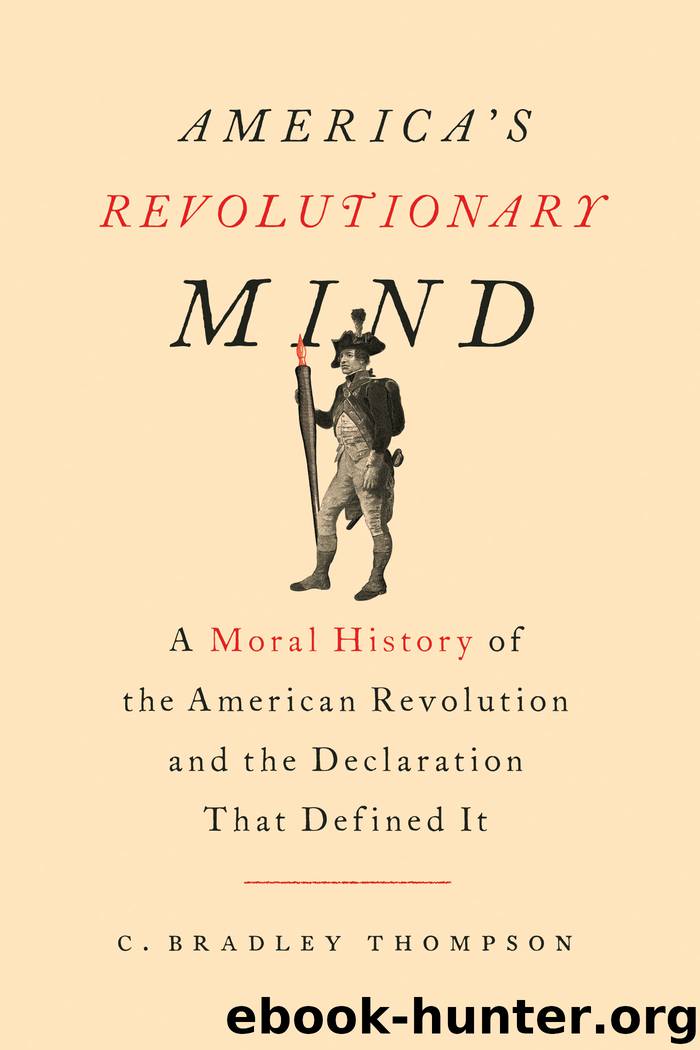America's Revolutionary Mind by C. Bradley Thompson;

Author:C. Bradley Thompson;
Language: eng
Format: epub
Publisher: Lightning Source Inc. (Tier 3)
Published: 2019-11-25T16:00:00+00:00
CONSENT IN PRACTICE: THE IMPERIAL CRISIS
The American Revolution began at a time when the colonists were among the wealthiest and freest people anywhere in the world. They were also loyal subjects of the Crown, and they reveled in their Englishness. However, Parliament’s passage of the Stamp Act in 1765 struck the colonists like a thunderbolt. It was a shock to their moral sensibilities, and it crystallized ideas that had been seeping into the American consciousness for several decades.
The colonists were certain that Parliament did not have the authority to tax them for purposes of raising revenue. They assumed their customary rights were protected by the British constitution and its core principle, according to which only their elected representatives could tax them. On a deeper level, American resistance to the Stamp Act and later to the Townshend, Tea, and Coercive Acts was a response to unjust acts of power deemed arbitrary and potentially without limit. The Stamp Act unleashed a torrent of rebuke, much of it in a moral idiom that spoke, remarkably, of tyranny and slavery. The first convulsion of the American rebellion thus did not occur for economic or even for political reasons. It was primarily a moral uprising against political legislation passed by the British Parliament. The colonists had every reason, certainly every political and economic reason, to want to resolve this controversy as quickly as possible. Instead, they precipitated first a moral and then a political revolution that would turn the greater Britannic world upside down.
Though the Americans viewed the Stamp Act as unprecedented, they did have a foreshadowing of the coming storm the year before when Parliament passed the Sugar Act, which cleverly cut in half Britain’s duty on imported foreign molasses into the colonies. The problem with this new postwar legislation is that it created new enforcement mechanisms, the purpose of which was not to direct trade but to raise revenue to help defray the costs of maintaining a new imperial bureaucracy and an increase in Britain’s military presence in America. The Sugar Act was an ominous signal to the Americans. They viewed it therefore with concern and skepticism.
The colonists believed there was a necessary connection between taxation and representation, property and consent. Their Lockean moral logic taught them that what a man has honestly acquired through his own mental and physical labor cannot be taken from him without his consent. They believed this principle to be the most important guarantee of English liberty extending back to the time of Magna Carta and beyond. Furthermore, all Americans agreed with their British cousins that the “Right to legislate is originally in every Member of the Community.”14 It was the core principle of British constitutionalism. The problem was in determining how to extend the principle of consent to a political community of more than a few hundred people living in close proximity to one another. In other words, how does one ensure the consent of the governed given the impossibility of convening all the people all the
Download
This site does not store any files on its server. We only index and link to content provided by other sites. Please contact the content providers to delete copyright contents if any and email us, we'll remove relevant links or contents immediately.
The Secret History by Donna Tartt(16623)
The Social Justice Warrior Handbook by Lisa De Pasquale(11489)
Thirteen Reasons Why by Jay Asher(7788)
This Is How You Lose Her by Junot Diaz(5772)
Weapons of Math Destruction by Cathy O'Neil(5037)
Zero to One by Peter Thiel(4824)
The Myth of the Strong Leader by Archie Brown(4789)
Promise Me, Dad by Joe Biden(4447)
Beartown by Fredrik Backman(4418)
Stone's Rules by Roger Stone(4415)
How Democracies Die by Steven Levitsky & Daniel Ziblatt(4399)
The Fire Next Time by James Baldwin(4343)
100 Deadly Skills by Clint Emerson(4078)
A Higher Loyalty: Truth, Lies, and Leadership by James Comey(4033)
Rise and Kill First by Ronen Bergman(4012)
The David Icke Guide to the Global Conspiracy (and how to end it) by David Icke(3882)
The Farm by Tom Rob Smith(3872)
Secrecy World by Jake Bernstein(3782)
The Doomsday Machine by Daniel Ellsberg(3731)
